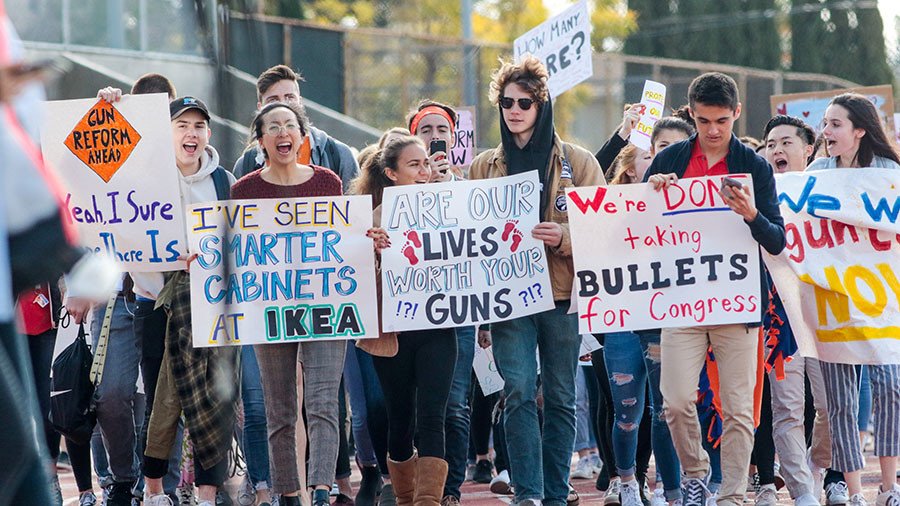Technology, Violence, Vulnerability: Rising phenomenon young people carrying out mass violence in US

Recent violence in the US seems to have caught analysts by surprise without having an ISIS-inspired terrorist ideology.
The last three attacks were carried out by young people with largely unknown motivations, yet we continue to ignore the larger issue of mental health in America’s youth and what exactly had led to this violent uprising.
Parkland, Florida High School. A high school in Maryland. Austin package bomber.
Two school shootings and a serial bomber within one month. All three perpetrators ranged from 18-23 years old.
Legally, a person is deemed an adult once they’ve reached 18 years of age in the US, but the truth is, these were children. An 18 year old high school female was also caught by authorities before she could bomb her Maryland high school in March 2017. All young people who reached a cognitive decision concluding that they had no choice in life but to carry out multiple murders. In each case, we may never know whether any of the victims were specifically chosen or whether it was completely random.
Going from gun violence to explosives seems a significant change, but it’s more indicative of the mental state and personality of the perpetrator. Guns are more direct – with the shooter wanting to see their victims and witness the horrific results of their actions, while explosive devices indicate less of desire to witness death or perhaps a subconscious realization that they can’t handle carrying out and witnessing a direct murder in close proximity.
In a 25 minute confession video taped by the 23 year old Austin bomber, he expressed no remorse but discussed his fear of finding employment and other factors he considered “aggravating” in his life leaving investigators clueless as to his motive for carrying out these bombings.
One thing is certain, there is a mental health issue with young people in the United States, and combining it with other factors prevalent in the minds of young people is leading to a mass streak of violence that many Americans aren’t yet capable or willing to truly deal with. There are three main issues that I believe have contributed to the problematic issue of decomposing mental health in America’s youth today.
Video games, comic books, and technology
Video games have been prevalent for some time – specifically shooter games and even games where the players can be US military forces taking out terrorists in Iraq and choosing their weapon. With the right wiring, these games can be played on projector screens making them seem real and helping the young person to feel comfortable killing a bad guy – even in a game. In many ways it could normalize the actions the player is taking, but video games alone are not training shooters nor are they providing the inspiration for their violence.
Mark Conditt, the Austin bomber, labeled the packages with the return address “Kelly Killmore.” In the widely popular DC Comic book series, many of the villains have alliterative names; e.g. Lex Luther, Damien Darhk, Captain Cold, Felix Faust, Hector Hammond, Doctor Destiny etc. Kelly Killmore seems to be derived of a comic book villain, and while I’m not implying that reading comic books (or playing video games) leads to violence, it does show the growing trend in young people attackers and where they have gained their knowledge. Many young people who lack socialization and real world experience seem to isolate themselves, creating a world where the acts they intend to carry out are possible and seemingly necessary in order to cope with the world around them.
In a recent publication in Clinical Psychological Science, psychologist Jean Twenge argued that teen depression and suicides have spiked since 2010 and the culprit is likely the rise and obsessive use of smartphones and technology. The Pew Research Center conducted a survey showing that 73% of American teenagers had smartphones by 2015. Twenge discussed that although smartphones alone don’t lead to depression, they do cause young people to experience much less personal interaction which causes feelings of isolation and loneliness despite any online “friendships” through social media accounts. Where books generally tend to provide an outlet for imagination and growth, losing interpersonal communication and social growth can create an isolated lifestyle where young people retreat into their own world learning to rely solely on their own perceptions of what life is and what they can or can’t do.
Additionally, studies have shown that teenagers forced to be off Facebook for a week reported less unhappiness. Teens continually on Facebook, by contrast, experienced more symptoms of depression.
Today, Facebook has become less “end user” oriented and more concerned with pushing political and social agendas based on those who manage the online platform and their counterparts. While this might not be so dangerous for adults who have gained confidence and spent time in their career or raising families, for teenagers uncertain of their future this can be a dangerous act leading to mass confusion, stemming from general ignorance that many young people enjoy before they graduate and enter the workforce.
Helplessness: News, Terrorism, and Fear Mongering
In the age of social media and mass media news streams (specifically in the United States), teenagers are significantly more exposed to political stories than they were 10-20 years ago. Generally, as we age and grow after college and in our careers, raising families and traveling the world, we become more capable of handling heavy news stories and even political firestorms that criticize the nation’s leadership. With President Donald Trump in office, the mainstream US media has seemingly lost its mind and its integrity, according to veteran journalist Bob Woodward who reported on the Nixon scandal. Stories surface every day that our entire way of life is coming to an end because of “evil Trump” and while many American adults have learned that these type of stories are merely attempts to undermine a political ideology or leader; teenagers aren’t equipped to filter such vitriol and hatred on their news feeds. They don’t understand that their country and rights aren’t completely destroyed, and this can lead vulnerable young people to feelings of helplessness. After all, why would they work to attend and graduate college with motivation to fulfill their career goals when all they read on social media or see on the news is that the “United States is in serious trouble because of its President?”
Additionally, the rise in global terrorism as seen on every major channel has also shown mentally troubled young people the ease of carrying out an attack against civilians without using conventional methods. Specifically, Islamic State (IS, formerly ISIS) has repeatedly called on its followers to utilize trucks, cars, minor explosives, and anything they can obtain that could take out as many victims as possible without catching law enforcement’s eye.
Politics over psychology
When news hits of another shooting in the US, the conversation immediately goes to gun control and the debate resumes – almost as though it’s been paused, waiting on the next attack. Democrats say there should be more gun control while Republicans argue for either mental health checks or providing law enforcement with better training. In both cases, neither side really “wins” because the individual victims and the details of the killer seem to fade into darkness within 72 hours.
Motive is sought, and if it’s misunderstood it’s ignored. We expect and await a “religious terrorist” motivation and when it’s not that, we crave some other widespread motivation to blame without addressing the core factors that led to the violence. Islamic extremist and ISIS-inspired violence has clear motives outlined in their statements – to clear the world of apostates and nonbelievers and violently overtake the West. It’s a sentiment we can label, unlike the mental health of our youth due to the technological-reliant society we have built for them with the deep divisions in political sides and hatred of those we don’t politically agree with. These facets of American society will only harm our children and continue to do so as we obsess over politics, social issues, and even terrorism while continuing to ignore the needs of our children – never recognizing how sitting in front of their phone or computer watching Facebook threads and news feeds may be instilling fear and animosity in them at an age where they should be outside, gathering with friends, or learning what passions drive them for a future career and family.
Gun control will not stop this violence. The Austin bomber made homemade explosives from materials that remained under law enforcement radar. Even ISIS has been able to bypass gun control restrictions in Europe. Those with the ideology to kill – for whatever reason – will always find a way to bring about destruction unless their underlying ideologies are properly addressed.
Mental health is a serious issue in the United States and it needs to be addressed. One thing is for certain though. As this current generation of teenagers continues this path, the US will become a country of people ill-equipped to handle life without technology, interpersonal conflict or global interactions unless we learn to focus on mental health and the well-being of our youth.
Jennifer Breedon for RT
Jennifer Breedon is an attorney specializing in foreign policy, international law and terrorism.
Think your friends would be interested? Share this story!
The statements, views and opinions expressed in this column are solely those of the author and do not necessarily represent those of RT.

















